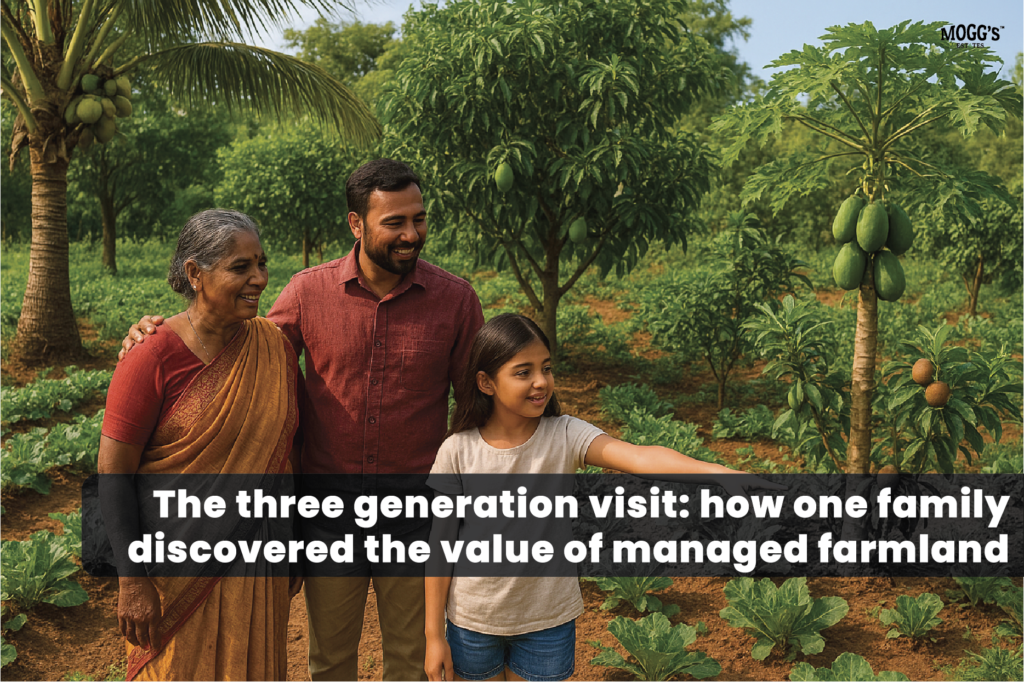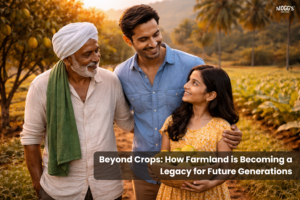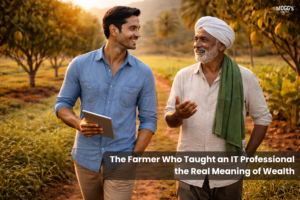Most investment stories begin with numbers, statistics, and long explanations.
This one began with a simple Sunday plan.
A family of six decided to take a short drive from Bengaluru to see a managed farmland project. The grandparents had been suggesting it for months, the parents were curious but unsure, and the kids were excited only because someone told them there might be cows and coconut trees.
There were three generations with three different reasons to come. None of them expected the farmland to change how they viewed wealth and peace.
The grandparents and a memory from home
For the grandparents, the visit felt like a return to a place they had been missing for decades. They had grown up in towns where fresh air, open fields, and local farming were part of daily life. The moment they got out of the car, the grandmother took a deep breath and said, “This feels like how our village used to smell.”
She touched the soil, smiled at a row of coconut trees, and told her granddaughter that land has its own patience. It neither rushes nor demands attention, yet it gives more than most things people own.
Her husband walked slowly along the pathway, stopping to observe the irrigation system. When the Mogg’s Estates team explained the water management and crop planning, he nodded the way people do when something simply makes sense. He was not thinking about investment returns. He was thinking about how the world could still feel this quiet.
For them, land was never a luxury. It was comfort, security, and a reminder of years when life moved at a gentler pace.
The parents and the question of the future
The parents arrived with a different mindset. They had spent the last ten years living inside deadlines, EMI reminders, and long commutes. They wanted an investment, not nostalgia. To them, managed farmland sounded too good to be true, so they came with doubts and Google search tabs open in their mind.
They asked every practical question like:
Who manages the farm?
How does the maintenance work?
What about legal checks?
What are the expected returns?
How does farmland appreciation compare to city property
The Mogg’s Estates team walked them through everything with clarity. Titles were clean. The farmland was fully managed. The irrigation systems were set. Crop planning was already mapped for the year. Regular yields would provide additional income. And because the farmland was located within 1 to 2 hours of Bengaluru, its appreciation potential was strong.
For the parents, all of this was reassuring. But something else convinced them more than the data. It was the feeling of space. Standing in the open land gave them a kind of mental silence they had forgotten existed. Their son was running behind a butterfly. Their daughter was feeding the cow grass. No traffic noise or notifications interrupted their thoughts.
For the first time in a long time, the parents looked at each other and felt like they were holding their breath a little less tightly.
The kids and the discovery of firsts
The children had their own version of the story, and it was far more dramatic.
To them, everything was a big moment.
The first time they saw a tractor.
The first time they stepped into a plantation.
The first time they held a coconut freshly cut from a tree.
The smallest things were magical.
A dragonfly sat on the boy’s arm.
A leaf bigger than the girl’s face.
The mud on their shoes that their mother normally would scold them for, but today she simply laughed.
Kids do not understand investment portfolios, but they know happiness.
And farmland gave them a sense of freedom they had never experienced inside the city. At one point, the younger one asked, “Can we come here every Sunday?”
It was an innocent question, but it lingered in the parents’ minds.
The moment the decision was made.
The family gathered under the shade of a mango tree. One of the Mogg’s team members brought a fresh tender coconut. The grandparents sat on the stone bench, the parents stood nearby, still discussing numbers, and the children lay on the grass, pretending to be explorers.
It was peaceful in a way that made time feel slower.
The father looked at the plot map again. The mother watched the kids running around with flowers in their hands. The grandparents were smiling at each other in a quiet, knowing way.
It was not a dramatic moment.
Nobody suddenly declared anything.
There was no big speech.
The decision formed naturally, as a seed becomes a sprout.
They realised farmland was not just an investment.
It was a gift for every person standing there.
The grandparents saw it as a connection to tradition.
The parents saw it as a stable, long-term asset.
The children saw it as a place that felt like a second home.
When the Mogg’s Estates team returned to ask if they had more questions, the father simply said, “We would like to proceed.”
Why this visit mattered more than they expected
This story is not unusual. Many families who visit managed farmlands near Bengaluru discover a mix of emotion and logic that brings them clarity. Here is why this visit changed everything for them:
1. They saw farmland as an investment they could actually understand
City real estate had become expensive and unpredictable.
Farmland felt simple and rooted in real value.
2. They realised that managed farmlands remove complications
With Mogg’s Estates handling cultivation, irrigation, maintenance, and documentation, the family knew they would not have to spend their weekends doing farm work.
3. The appreciation potential felt real
Land near the developing belts around Bengaluru has shown strong growth over the years.
The family could see the future value, not just imagine it.
4. Their children found a connection to nature
This mattered more to the parents than they expected.
They wanted their kids to grow up with space to breathe and explore.
5. The grandparents felt emotionally anchored
For the older generation, the farm did not feel like an investment.
It felt like a legacy.
How the story continued for them:
After a few months, the family built a small farmhouse on their plot. Nothing extravagant. Just a simple space with large windows and a view of plantations. They started visiting once a month. Sometimes for picnics. Sometimes with friends. Sometimes, only the grandparents went for a quiet morning walk. The parents set aside the yield income for the children’s future.
The grandparents planted a few mango saplings with the kids.
The children started calling it “our Sunday farm.”
It became part of their lives in a way that no other investment ever had. And that is the quiet power of farmland ownership.
It gives you wealth, yes.
But it also gives you something wealth alone cannot provide—a sense of belonging.
Why Mogg’s Estates fit their story
The family chose Mogg’s because they wanted:
- Clean titles
- Full-scale management
- Transparent processes
- Agro planning
- Sustainable farming practices
- Long-term appreciation potential
- Farmland within an accessible distance from Bengaluru
The combination felt right for them. It gave them both clarity and comfort. In the end, this was not just three generations visiting a farm; it was three generations finding three different answers to one question:
What kind of future do we want to build?
For the grandparents, the answer was peace.
For the parents, the answer was stability.
For the children, the answer was space to grow.




